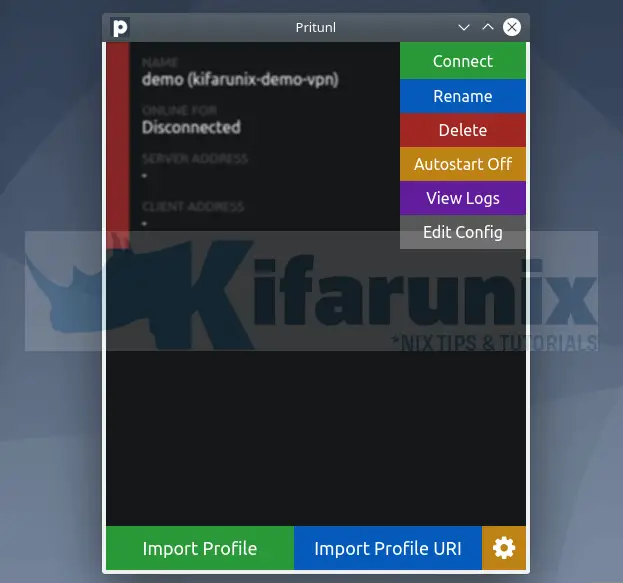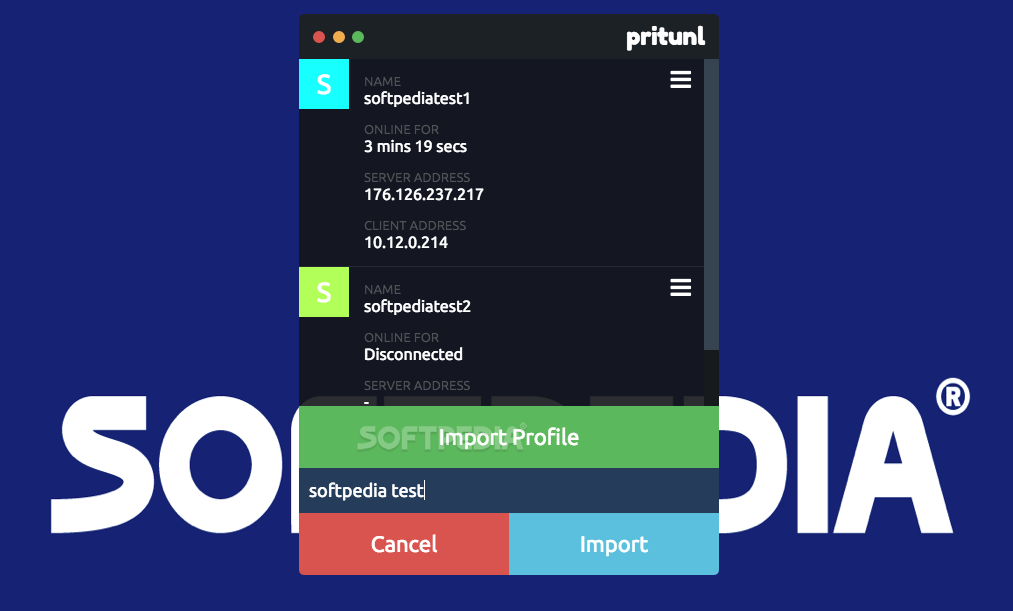

Keeping configuration data in a database also is far more flexible than maintaining static configuration files, which you will not find with Pritunl: a fixed part of Pritunl is a web interface for handling the user-facing configuration. The configuration back end for this kind of construct is easy to implement, thanks to the database – in particular because the database comes with its own cluster functionality. In scale-out environments with multiple Pritunl instances at multiple locations, the Pritunl servers exchange data about their configurations, and they use MongoDB to do so. Why does a VPN server need a database? As it turns out, Pritunl uses MongoDB to store and manage its own settings in the background.
#DOWNLOAD PRITUNL INSTALL#
When you install Pritunl, MongoDB is also installed as a mandatory requirement. Installing is not difficult with these repositories: many of the guides focus on enabling the repository locally and then using the package manager to install the Pritunl package.

The vendor also has something for RPM-based systems such as CentOS 7 or the current Fedora release.
#DOWNLOAD PRITUNL SOFTWARE#
The vendor offers its own software repositories for popular distributions, such as the current stable version of Debian and the current LTS release of Ubuntu, 14.04. Can the program really offer more? Is it really as easy to install as OpenVPN? And, what about the Pritunl Enterprise products ? Pritunl, built on the OpenVPN protocol, is sounding the attack: Pritunl simply promises to be the perfect VPN solution for practically any implementation and to exceed the functionality and convenience of OpenVPN alone. Ideally, establishing a working client-server setup with OpenVPN will take you just a few minutes. Clients for Windows, Linux, and OS X are naturally also available.
#DOWNLOAD PRITUNL ANDROID#
Moreover, OpenVPN is very easy to set up on the client side: Android comes with an OpenVPN client out of the box, and if you use iOS, you will find a matching tool in the App Store. When you finish installing Ubuntu 14.04, for example, all you need to do is add the openvpn package to operate an OpenVPN server. However, what should be your tool of choice for this task?Īt one time, IPsec was more or less the standard in all things VPN however, in the course of many years, OpenVPN has built up an excellent reputation for security and ease of use. If so, maybe you would have to add a NAT rule, but check first if it works without any NAT rule.Businesses often need to give their road warriors access to the enterprise IT, and some private users also appreciate the ability to "phone home." With an increasing numbers of households depositing their personal documents on large networked drives, it's little wonder that many people need to be able to access their data at home via VPN when they are on the road.

Not sure if you have to configure the Advanced Settings on that rule, but if you still cannot ping the servers, you may have to go and change the TCP flags to "Any" and the State Type to "sloppy" (see below)Īlso, I assume these VPN users will be having internet access via your pfsense, which means that they will be going to the outside world via the WAN interface. Then I would go to the firewall rules and I would add a rule to allow the OpenVPN_Users network towards the 102.17.172.0 network. *I would create an alias for these VPN users and name it "OpenVPN_Users" (Alias type is network with an IP address 192.168.226.0/24). In order to see if the Pritunl VPN user is going out with its assigned IP addres (192.168.2226.2) and not with the Pritunl server IP (192.168.226.1), go to Packet Capture in pfsense and check the traffic on the pfsense interface that belongs to 172.17.172.x network. In that server, you will have to add a route towards the 172.17.172.x network (see below)Īfter you do the above, then you can start pinging from a VPN user towards your Servers. First of all, you need to clarify if the pritunl VPN users (while connected) will be "going" out with their 192.168.22.x IP address, or with the IP address of the Pritunl network interface (192.168.226.1).Īlso, I assume that you have created a Server in the pritunl that assigns the IP addresses.


 0 kommentar(er)
0 kommentar(er)
